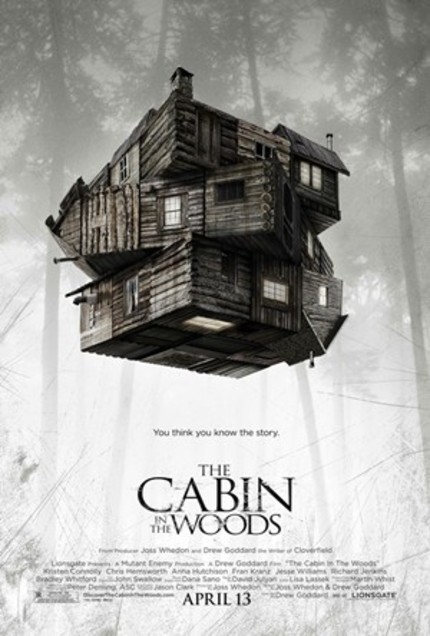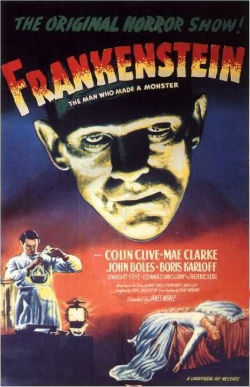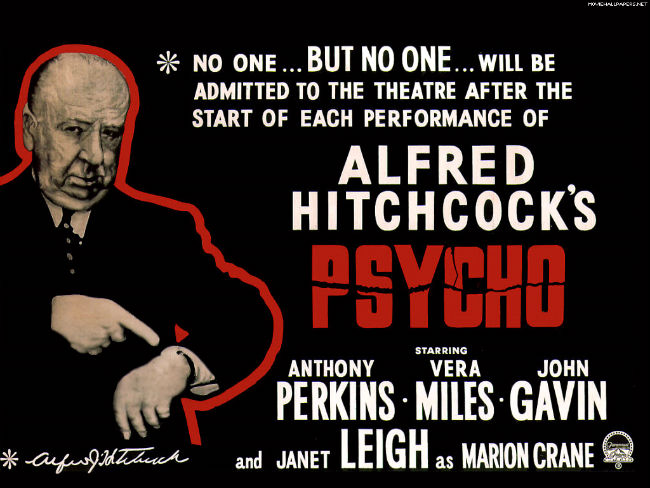Hollywood Grind: Shocks, Surprises, and Spoilers, From FRANKENSTEIN to CABIN

"Spoiler alert: Usually posted at the beginning of an article; intended to advise potential readers that details about plot turns, narrative twists, cast members, character names, endings, and post-credit footage may be revealed." -- From the proposed 'Dictionary of Common Sense and Courtesy for Movie Reviews.'
The selling of The Cabin in the Woods almost solely as a gigantic mystery whose surprises MUST NOT be revealed in advance is understandable as a marketing tool. Thus, a number of people, including our own Jason Gorber (in his review, published last month in conjunction with the film's official world premiere at SXSW) and Scott Weinberg on Twitter, have advised not reading anything about it in advance.
And I can respect that, even as I also respect the writing ability of certain film critics who have chosen to include major spoilers in their reviews. For myself, I'm glad that I managed to see it without having anything major spoiled, and I wouldn't want to deprive anyone else of that opportunity. So I won't reveal anything about The Cabin in the Woods in this article, except to say that I recommend it heartily -- with certain reservations.
What, though, is the statute of limitations on spoilers?
More than 100 years after its source material was originally published, the first feature-length version of Frankenstein made its way to the big screen. Audiences in 1931, potentially, were aware of the basic plot elements: popular stage adaptations had been staged in the 1920s; posters described Frankenstein as "The Man Who Made a Monster" and featured a graphic artist's (non-photographic) representation of the creature.
 Yet when "the monster" first appeared on screen, it must have been something of a shock. Director James Whale staged the creation sequence with great theatrical flourish: the laboratory, the lightning; Frankenstein's cry: "IT'S ALIVE!" is one of the most electrifying moments in cinema history. We don't see the monster walking under his own power until he backs into a scene through a doorway and slowly turns around, whereupon Whale cuts not once, but twice -- from a medium shot to a close-up to an extreme close-up -- showing a face that might once have inspired nightmares.
Yet when "the monster" first appeared on screen, it must have been something of a shock. Director James Whale staged the creation sequence with great theatrical flourish: the laboratory, the lightning; Frankenstein's cry: "IT'S ALIVE!" is one of the most electrifying moments in cinema history. We don't see the monster walking under his own power until he backs into a scene through a doorway and slowly turns around, whereupon Whale cuts not once, but twice -- from a medium shot to a close-up to an extreme close-up -- showing a face that might once have inspired nightmares.
Does that description constitute a spoiler for a reader in 2012? What if mention were made of a little girl and her fate? What about the name of the actor playing the monster -- withheld in advance of the film's release and listed in the opening credits as "?" What about the many differences between the novel and the film, including the ending?
More than 30 years after its source material was originally published, the first film version of Witness for the Prosecution made its way to the big screen. Audiences in 1957, potentially, were aware of the basic plot elements: the story had finally been published in the U.S. in 1948 and a stage version was mounted in London in 1953.
Director Billy Wilder withheld the final 10 pages of the script from the cast until it was time to shoot those scenes. The marketing campaign asked potential viewers not to reveal the ending. At the end of the movie, a voice-over narrator read the following: "The management of this theatre suggests that for the greater entertainment of your friends who have not yet seen the picture, you will not divulge, to anyone, the secret of the ending of Witness for the Prosecution." (Writer and programmer Rodney Perkins reminded me that 1955's Les Diaboliques has a similar plea at the end.)
Does that description, placing heavy emphasis on the ending, in itself constitute a spoiler for a reader in 2012? What if the actress who played a certain mysterious character were named? What about the differences between Agatha Christie's original short story, her revised version, and the film, including the ending?
About one year after its original source material was published, the first film version of Psycho made its way to the big screen. Audiences in 1960, potentially, were aware of the basic plot elements: Robert Bloch's novel was loosely based on the infamous exploits of Ed Gein, who had been arrested in 1957.

As multiple people pointed out to me via Facebook and Twitter, director Alfred Hitchcock insisted that critics not be allowed to see the film in advance, and the marketing campaign requested that no one reveal the ending. Theoretically, no one was allowed into the theater after the film began.
Does any of that constitute a spoiler?
While marketing campaigns continued to play upon that theme over the years -- 1992's The Crying Game is an outstanding example -- concerns and complaints about reviews (and the Internet) revealing spoilers has become a growing phenomenom.
The posters and original trailer for 1999's The Sixth Sense played upon the scary idea that a little kid thought he could see dead people. At the time, myself and some of my work mates were addicted to the relatively new idea of watching trailers on the Internet, and I had fallen under the spell of Ain't It Cool News and other groundbreaking news and gossip sites. So I was aware that The Sixth Sense was becoming a sleeper hit and that it held surprises. As more friends saw it and excitedly urged me to see it ASAP, they all said: "Don't read anything about it, you have to see it before someone spoils it for you."
Thus primed, I spent the first 10-15 minutes figuring out the "mystery," and then sat impatiently waiting for the resolution. Did everyone telling me to 'expect a surprise,' in itself, constitute a spoiler? Was my first viewing of the film ruined by my anticipation? To a degree, yes.
 About two years later, I caught up with 1998's Expect the Unexpected on DVD. It was a Hong Kong crime film and a Milky Way Image production, and others had recommended it without giving away any plot details. By its very title, of course, I kept waiting for "the unexpected" to happen. When it did, I was unexpectedly devastated, left trembling, alone in my apartment late at night. It shook me to my core.
About two years later, I caught up with 1998's Expect the Unexpected on DVD. It was a Hong Kong crime film and a Milky Way Image production, and others had recommended it without giving away any plot details. By its very title, of course, I kept waiting for "the unexpected" to happen. When it did, I was unexpectedly devastated, left trembling, alone in my apartment late at night. It shook me to my core.
I could explain why, but that would be a spoiler, wouldn't it?
Traditionally, print reviews in newspapers did not generally appear until the day of release, and reviews in magazines might not hit until weeks or months later. (The moviegoing public was not generally aware of the trade publications and their early reviews.) The world wide web, of course, changed all that, pushing all outlets to publish reviews quicker, and as far in advance as possible, especially in the past decade.
In addition, online conversations about movies have expanded greatly with the advent of social networks, which make it much easier (and more instantaneous) to share thoughts publicly, although often with less forethought, than bulletin boards, forums, and email groups ever did. To a greater or lesser degree, movie news sites, including ScreenAnarchy, present news about casting possibilities, films in production, posters, images, teasers, trailers, and on and on.
As a consequence, it's easier to spoil more movies for more people than ever before, sometimes inadvertently, sometimes intentionally. (It's especially aggravating if you've taken pains to avoid spoilers for a specific film, such as The Cabin in the Woods.) But, again, what constitutes a spoiler nowadays? And how long must you wait before revealing something that somebody else might consider a spoiler?
I continue to wrestle with these basic questions. (Thanks to all who have shared their observations via Twitter and Facebook.) As a writer and critical reviewer, I want to be free to express my opinions in the manner I deem best, even as filmmakers are free to express their creativity in the manner they decide is best.
But in the same way that filmmakers must overcome limitations that are often beyond their control (budget, cast, locations, and so forth), writers and critical reviewers must overcome limitations that are often beyond their control (embargoes from publicists, distributors, and filmmakers; expectations from readers; deadlines and style/formatting requirements from editors and publishers, and so forth). And, to my mind, and for my reviews and articles, that certainly includes the courtesy of a spoiler alert.
The Cabin in the Woods opens wide in the U.S. and Canada on Friday, April 13.
Hollywood Grind is a weekly column.







